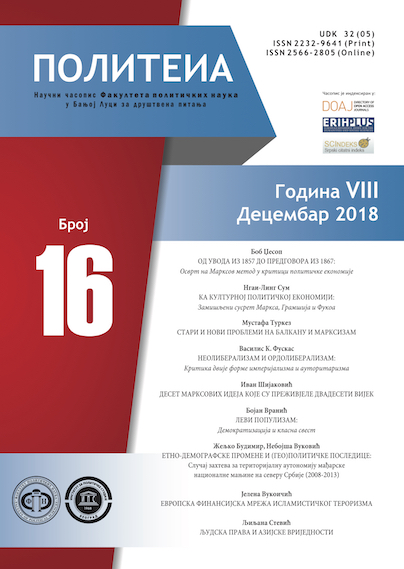TOWARDS A CULTURAL POLITICAL ECONOMY: Staging an Encounter between Marx, Gramsci, and Foucault
Abstract
This article elaborates one possible development of Marx’s legacy 200 years after his birth. It responds to the influence of post-structuralism and its related ‘cultural turn’ on academic Marxist analyses by examining the material and discursive dimensions of changing social relations in capitalist social formations. In this context, it proposes a cultural political economy approach to bridge the theoretical divide between constructivism and structuralism. It suggests that, given his long-standing interests in language and semiosis as key aspects of the critique of economic, political, and social life, Marx can fruitfully be read as a proto-cultural political economist. It is further suggested that Marx’s contributions to the critique of political economy can be enhanced by articulating them with the work of two later critical theorists, namely, Antonio Gramsci and Michel Foucault. Accordingly, this article stages an encounter between Marx, Gramsci and Foucault to explore the interface between the semiotic and extra-semiotic aspects of social relations and then identifies four modes of selectivity as a heuristic tool for examining the production of hegemony and the remaking of social relations.
References
Balibar, E. (1992). Foucault and Marx: The question of nominalism. In T. J. Armstrong (Ed.), Michel Foucault, philosopher (pp. 38-56). London, England: Routledge.
Callon, M. (1998). The laws of the market. Oxford: Blackwell.
Ekers, M. & Loftus, A. (2008). The power of water: Developing dialogues between Foucault and Gramsci. Environment and Planning D: Society and Space, 26, 698-718.
Dumez, H. & Jeunemaître, A. (2010). Michel Callon, Michel Foucault and the dispositive. Le Libellio d’AEGIS, 6(4), 27-37.
Elden, S. (2007). Rethinking governmentality. Political Geography, 26, 29-33.
Fairclough, N. (1989). Language and power. Harlow, England: Longman.
Fairclough, N. (2003). Analysing discourse. London, England: Routledge.
Foucault, M. (1977). Discipline and punish: The birth of a prison. trans. A. Sheridan, London, England: Allen Lane.
Foucault, M. (1979). History of sexuality: Volume 1: introduction. trans. R. Hurley. London, England: Allen Lane.
Foucault, M. (1980). Power/knowledge: Selected writings and other interviews 1972-1977, trans. C. Gordon, L. Marshall, J. Mepham, & K. Soper. Brighton, England: Wheatsheaf.
Foucault, M. (1984). History of sexuality 3: The care of the self. Harmondsworth, England: Penguin.
Foucault, M. (2008). The birth of biopolitics: Lectures at the Collège de France, 1978-1979, trans. G. Burchell. Basingstoke, England: Palgrave
Gramsci, A. (1971). Selections from the prison notebooks. London, England: Lawrence & Wishart.
Hay, C. (2006). Constructivist institutionalism. In R. A. W. Rhodes, S. A. Blinder, & B. A. Rockman (Eds.), The Oxford handbook of political institutions. Oxford: Oxford University Press, 56-74.
Ives, P. (2004). Language and hegemony in Gramsci. London, England: Pluto Press.
Jessop, B. (2005). Cultural political economy, the knowledge-based economy, and the state. In A. Barry & D. Slater (Eds.), The technological economy (pp. 144-65). London, England: Routledge.
Jessop, B. (2007). State power: A strategic-relational approach. Cambridge, England: Polity.
Jessop, B. (2010). Another Foucault effect? Foucault on governmentality and statecraft. In U. Bröckling, S. Krasmann, & T. Lemke (Eds.), Governmentality: Current issues and future challenges (pp. 239-48). London, England: Routledge.
Jessop, B. & Sum, N-L. (2018). Language and critique: Some prefigurations of critical discourse studies in Marx’s work. Critical Discourse Studies, 15, 325-37.
Kalyvas, A. (2004). The stateless theory: Poulantzas’s challenge to postmodernism. In S. Aronowitz & P. Bratsis (Eds.), Paradigm lost: State theory reconsidered (pp. 105-42). Minneapolis, MN: University of Minnesota Press.
Laclau, E. & Mouffe, C. (1985). Hegemony and socialist strategy. London, England: Verso.
Lemke, T. (2003). Andere Affirmationen: Gesellschaftsanalyse und Kritik im Postfordismus. In A. Honneth & M. Saar (Eds.), Zwischenbilanz einer Rezeption (pp. 259-74). Frankfurt am Main, Germany: Suhrkamp.
MacDonald, B. J. (2002). Marx, Foucault, genealogy. Polity, 34, 259-84.
Marsden, R. (1999). The nature of capital: Marx After Foucault. London, England: Routledge.
Marx, K. (1970). Contribution to the critique of political economy. London, England: Lawrence & Wishart.
Marx, K. (1976). Capital, vol. I. London, England: Lawrence & Wishart.
Marx, K. (1972). Theories of surplus value, 3 volumes. London, England: Lawrence & Wishart.
Olssen, M. (2006). Michel Foucault: Materialism and education. London, England: Paradigm Publishers.
de Saussure, F. (1983). Course in general linguistics. London, England: Duckworth.
Schmidt, V.A. (2008). Discursive institutionalism: The explanatory power of ideas and discourse. Annual Review of Political Science, 11, 303–26.
Senellart, M. (2008). Course context. In M. Foucault, Security, territory, population (pp. 369-401). Basingstoke, England: Palgrave.
Springer, S. (2010). Neoliberal discursive formations: on the contours of subjectivation, good governance and symbolic violence in post-transitional Cambodia. Environment and Planning D: Society and Space, 28, 931-50.
Stoddart, M. (2005). The Gramsci-Foucault nexus and environment sociology. Alternative Routes, 21, 26-40.
Sum, N-L. (2009). The production of hegemonic policy discourses: ‘Competitiveness’ as a knowledge brand and its (re-)contextualizations. Critical Policy Studies, 3, 184-203.
Sum, N-L. and Jessop, B. (2013) Towards a cultural political economy. Cheltenham, England: Edward Elgar.
Wodak, R. & Mayer, M. (2009). Critical discourse analysis: History, agenda, theory and methodology. In R. Wodak & M. Mayer (Eds.), Methods of critical discourse analysis (2nd ed.) (pp. 1-33). London, England: SAGE.
Autori koji objavljuju u ovom časopisu pristaju na sljedeće uslove:
- Autori zadržavaju autorska prava i pružaju časopisu pravo prvog objavljivanja rada i licenciraju ga "Creative Commons Attribution licencom" koja omogućava drugima da dijele rad, uz uslov navođenja autorstva i izvornog objavljivanja u ovom časopisu.
- Autori mogu izraditi zasebne, ugovorne aranžmane za neekskluzivnu distribuciju članka objavljenog u časopisu (npr. postavljanje u institucionalni repozitorijum ili objavljivanje u knjizi), uz navođenje da je članak izvorno objavljen u ovom časopisu.
- Autorima je dozvoljeno i podstiču se da postave objavljeni članak onlajn (npr. u institucionalni repozitorijum ili na svoju internet stranicu) prije ili tokom postupka prijave rukopisa, s obzirom da takav postupak može voditi produktivnoj razmjeni ideja i ranijoj i većoj citiranosti objavljenog članka (Vidi Efekti otvorenog pristupa).

